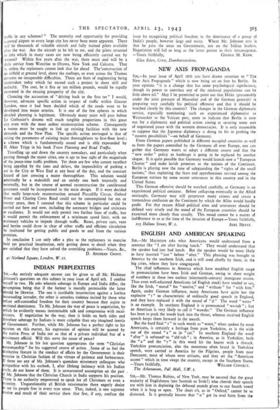NEW AXIS PROPAGANDA
Sul,—In your issue of April 16th you have drawn attention to "The New Axis Propaganda " which is now being set on foot by Berlin. In your opinion " it is a change that has some psychological significance, though its power to convince any of the enslaved populations can he little above nil." May I be permitted to point out that Hitler (presumably under the joint pressure of Mussolini and of the German generals) is preparing very carefully his political offensive and that it should be watched closely by this country? The changes in the German diplomatic service, especially nominating such an experienced diplomatist as Weizsaccker to the Vatican post, seem to indicate that Berlin is now out for a diplomatic and political action aiming at securing some sort of negotiated peace with the western democracies. It is only reasonable to suppose that the Japanese diplomacy is doing its bit in probing the " eastern possibilities "—on behalf of Germany.
From German papers published in different occupied countries as well as from the papers controlled by the Germans all over Europe, one can gather that Germany wants to adopt a different course and that the " new order " policy as bankrupt is going to be replaced by another slogan. It is quite possible that Germany would launch now a "European Charter " and make lavish promises to the nations of the Continent. Berlin is playing now the tune of safeguarding the " rights of the small nations," thus exploiting the fears and apprehensions revived among the European nations by some recent utterances in this country and in the United States.
This German offensive should be watched carefully, as Germany is an experienced political conjuror. Before collapsing eventually to the Allied onslaught, Germany may still perpetrate many crimes and create a tremendous confusion on the Continent by which the Allies would hardly profit. For that reason Allied political aims and utterances should he defined very wisely and the mood of the European countries should he examined more closely than usually. This mood cannot be a matter of indifference to us at the time of the invasion of Europe.—Yours faithfully,


























 Previous page
Previous page